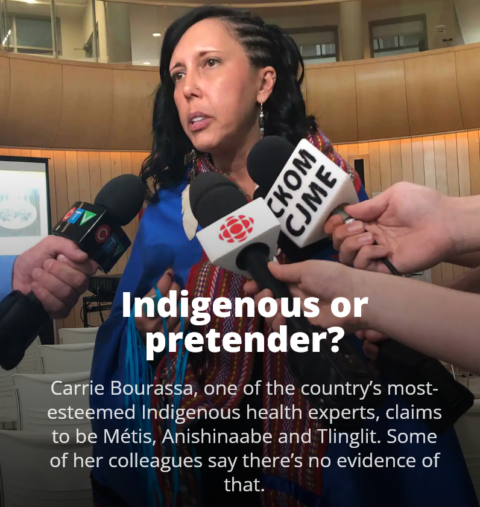In Thursday’s NP Platformed newsletter, Colby Cosh updates us on the story of Carrie Bourassa, who had effortlessly surfed to high profile, well-remunerated positions at the University of Saskatchewan and with the federal government largely on the basis of her claimed First Nations background:

Carrie Bourassa with media.
Lead photo in Geoff Leo’s article for the CBC – https://www.cbc.ca/newsinteractives/features/carrie-bourassa-indigenous
Newspapers have a slightly nasty characteristic: it’s easy for them to get pre-emptively mad when institutions are a little slow to do the right thing, and it’s also easy for them to forget to give credit when those institutions get around to it.
So let’s acknowledge that the federal government and the University of Saskatchewan are dealing — as best they can, almost certainly — with their shared Carrie Bourassa problem.
Two weeks ago, CBC News investigative reporter Geoff Leo published an astonishing tour de force. His feature article established, beyond almost any doubt, that Bourassa, a high-profile Indigenous scholar who told and published countless stories of racist treatment and childhood adversity, is actually a fabulist from a wealthy white family. The Institute of Indigenous Peoples’ Health soon put Bourassa, its scientific director, on unpaid leave. The U of S suspended her with pay, probably having no better immediate alternative.
[…]
Since Prof. Bourassa was put on ice in her lucrative Aboriginal-health jobs, Indigenous folk have been labouring to explain in the press what was wrong with her concoction and aggressive peddling of a fake Métis upbringing on the mean streets of Regina. Drew Hayden Taylor’s Globe and Mail op-ed about Bourassa’s “cultural Munchausen syndrome” is instructive and funny, but we hope it is all right to tell Aboriginal-Canadians that no white settler with a lick of sense would consider Bourassa’s tapestry of falsehoods to be harmless “fibs”. This may be a self-serving observation, but her confabulations about her personal history wouldn’t be consistent with the standards of a newspaper, let alone those of a university.
About a year ago, the Saskatchewan Health Research Foundation gave Bourassa an award (not her first) and published a capsule summary of her career. If you read it, you will notice how she was, from time to time, offered career advancement out of the blue by Indigenous supporters who had been taken in by her stories. Even a white grad student living on ramen in a basement apartment might be a little ticked about this. The University of Saskatchewan’s original claim that Prof. Bourassa hadn’t benefited from claiming Aboriginal ancestry is pathetic hokum: Bourassa tellingly accused her own sister of “looking for … a way to make some money” by accepting Indigenous scholarship funds during her PhD studies.
And it probably occurred to the USask brass sometime between the two press releases that an investigative reporter like Leo, in taking on a topic, always looks a couple articles ahead. Bourassa, for example, claims to have suffered from tuberculosis in her late 20s — a useful credential, unfortunately, for someone studying the field of Indigenous health. It’s useful because the disease has been nearly eliminated among non-Indigenous Canadians: the incidence rate for First Nations is 40 times higher, and the cases tend to be concentrated in remote northern Indigenous communities. Even if we overlook Bourassa’s propensity for creative autobiography … well, if she contracted TB, she was certainly very unlucky.



